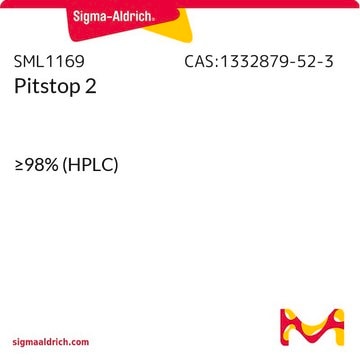SAE0087
Filipin III ready made solution
from Streptomyces filipinensis, 1mg/ml in DMSO based solution
Sinónimos:
Filipin III solution
Iniciar sesiónpara Ver la Fijación de precios por contrato y de la organización
About This Item
UNSPSC Code:
12352200
NACRES:
NA.77
Productos recomendados
Quality Level
assay
≥95% (HPLC)
form
ready-to-use solution
storage condition
protect from light
shipped in
dry ice
storage temp.
−20°C
Categorías relacionadas
General description
Filipin III is a polyene macrolide antibiotic and the major component isolated from cultures of S. filipinensis. 1 Due to its ability to fluoresce and bind to cholesterol, Filipin has been widely
used as a probe for sterol location in biological membranes 2 and has been used clinically as a stain for free cholesterol in the study of Type C Niemann-Pick disease. 3 Filipin inhibits prion protein (PrP) endocytosis and causes the release of PrP from the plasma membrane. 4 Filipin III was found to trigger signaling responses in tobacco cells, including a NADPH oxidase-dependent production. 5. The antifungal mechanism of action may be due to altering membrane permeability and associated functions by binding to membrane sterols. Filipin inhibits prion protein (PrP) endocytosis and causes the release of PrP from the plasma membrane.
used as a probe for sterol location in biological membranes 2 and has been used clinically as a stain for free cholesterol in the study of Type C Niemann-Pick disease. 3 Filipin inhibits prion protein (PrP) endocytosis and causes the release of PrP from the plasma membrane. 4 Filipin III was found to trigger signaling responses in tobacco cells, including a NADPH oxidase-dependent production. 5. The antifungal mechanism of action may be due to altering membrane permeability and associated functions by binding to membrane sterols. Filipin inhibits prion protein (PrP) endocytosis and causes the release of PrP from the plasma membrane.
Application
Filipin has been used in a double staining procedure as a probe for the detection of lipoproteins in polyacrylamide gel and immobilized on nitrocellulose membranes. It is also widely used to localize and quantitate unesterified cholesterol by virtue of a specific fluorescent complex.
Other Notes
- Filipin III solution is very sensitive to air and light. Upon receipt aliquot and store at -20°C avoid freeze thaw cycles.
- Filipin III is used in various concentrations depending on the specific protocol used. Dilute 1mg/ml stock solution with appropriate buffer according to the used protocol.
- Filipin III interaction with cholesterol alters the absorption and fluorescence spectra, for visualization with a fluorescence microscope use excitation at 340-380 nm and emission at 385-470 nm (Filipin fluorescent staining photo-bleaches very rapidly, thus the sample should be analyzed immediately).
Storage Class
10 - Combustible liquids
wgk_germany
WGK 1
flash_point_f
188.6 °F
flash_point_c
87 °C
Certificados de análisis (COA)
Busque Certificados de análisis (COA) introduciendo el número de lote del producto. Los números de lote se encuentran en la etiqueta del producto después de las palabras «Lot» o «Batch»
¿Ya tiene este producto?
Encuentre la documentación para los productos que ha comprado recientemente en la Biblioteca de documentos.
Los clientes también vieron
Pan Gao et al.
Investigative ophthalmology & visual science, 63(5), 32-32 (2022-05-27)
Bietti crystalline dystrophy (BCD) is a progressive retinal degenerative disease primarily characterized by numerous crystal-like deposits and degeneration of retinal pigment epithelium (RPE) and photoreceptor cells. CYP4V2 (cytochrome P450 family 4 subfamily V member 2) is currently the only disease-causing
Yun-Qi Zhou et al.
Emerging microbes & infections, 11(1), 1135-1144 (2022-03-29)
The spread of severe acute respiratory syndrome coronavirus 2 (SARS-CoV-2) and its variants is threatening public health around the world. Endocytosis functions as an important way for viral infection, and SARS-CoV-2 bears no exception. However, the specific endocytic mechanism of
Nina H Pipalia et al.
Journal of lipid research, 47(2), 284-301 (2005-11-17)
Niemann-Pick disease type C (NPC) is an autosomal recessive genetic disorder manifested by abnormal accumulation of unesterified cholesterol and other lipids. We screened combinatorially synthesized chemical libraries to identify compounds that would partially revert cholesterol accumulation. Cultured CHO cells with
M A Castanho et al.
The Journal of biological chemistry, 267(1), 204-209 (1992-01-05)
The alterations in the absorption and fluorescence spectra observed for the polyene antibiotics filipin and nystatin in the presence of cholesterol are due to an exciton interaction (polyene aggregates) and cannot be attributed to a specific sterol-antibiotic complex. Filipin and
Filipin, an Antifungal Antibiotic: Isolation and Properties
George B. Whitfield, Thomas D. Brock, Alfred Ammann, David Gottlieb, and Herbert E. Carter
Journal of Chemical and Pharmaceutical Sciences
, 4799-4801 (1955)
Nuestro equipo de científicos tiene experiencia en todas las áreas de investigación: Ciencias de la vida, Ciencia de los materiales, Síntesis química, Cromatografía, Analítica y muchas otras.
Póngase en contacto con el Servicio técnico











